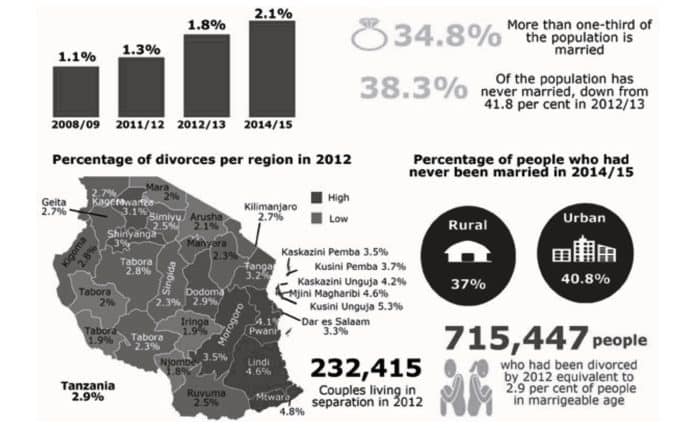A Comprehensive Analysis of the Divorce Rate in Tanzania in 2020: Trends, Causes, and Solutions
Introduction to the Divorce Rate in Tanzania
The divorce rate in Tanzania has been a topic of concern in recent years. With the changing dynamics of society, it is important to understand the trends, causes, and possible solutions to address this issue. In this article, we will delve into the divorce rate in Tanzania 2020, analyzing its trends, and factors influencing it and proposing solutions to reduce it.
Divorce Rate Trends in Tanzania: 2010-2020
Over the past decade, the divorce rate in Tanzania has experienced a steady increase. According to recent data, the divorce rate in Tanzania 2020 reached an all-time high. This upward trend can be attributed to various factors, including changes in societal norms, economic challenges, and increasing gender equality.
One of the main reasons for the rise in divorce rates is the changing roles of women in Tanzanian society. With more women gaining access to education and employment opportunities, they are becoming financially independent and are less likely to tolerate unhappy marriages. Additionally, the stigma associated with divorce has reduced, leading couples to opt for separation when faced with irreconcilable differences.
Factors Influencing the High Divorce Rate in Tanzania
The divorce rate in Tanzania 2020 can be attributed to a combination of socioeconomic, cultural, and religious factors. These factors contribute to marital dissatisfaction and conflict, ultimately leading to divorce.
Socioeconomic Factors Contributing to the Divorce Rate
The economic challenges faced by many Tanzanian families have a significant impact on the divorce rate. Unemployment, poverty, and financial instability can strain relationships and create tension within marriages. Couples often find it difficult to maintain a healthy and stable relationship when faced with financial hardships.
Furthermore, the increasing cost of living, coupled with rising expectations, puts additional pressure on marriages. The inability to meet these expectations can lead to dissatisfaction, conflict, and ultimately divorce.
Cultural and Religious Influences on Divorce in Tanzania
Tanzania is a culturally diverse country with a rich heritage. However, cultural and religious beliefs can sometimes contribute to the high divorce rate. Traditional gender roles, for example, may place unrealistic expectations on spouses, leading to dissatisfaction and conflict within marriages.
Religion also plays a significant role in Tanzanian society, and different religious beliefs may have varying views on divorce. While some religions may discourage divorce, others may allow it under certain circumstances. These differing perspectives can influence the decision-making process for couples considering divorce.
Legal Aspects of Divorce in Tanzania

In Tanzania, divorce is governed by the Marriage Act of 1971, which outlines the legal procedures and requirements for obtaining a divorce. The act provides grounds for divorce, such as adultery, cruelty, desertion, and irretrievable breakdown of marriage. It also addresses issues related to child custody, property division, and financial support.
However, despite the legal framework, many couples face challenges in navigating the divorce process. Limited access to legal aid, lengthy court procedures, and cultural barriers can make it difficult for individuals to seek legal remedies and protect their rights during the divorce proceedings.
The Impact of Divorce on Children and Families
Divorce not only affects the couple involved but also has a profound impact on children and families. Children from divorced families often experience emotional and psychological distress, which can affect their overall well-being and development. The disruption of family dynamics, changes in living arrangements, and potential conflicts between parents can create a challenging environment for children to thrive.

Moreover, divorce can have long-lasting financial implications for families, especially for women who may face economic hardships and struggle to provide for their children. It is crucial to provide support and resources to help families navigate the challenges associated with divorce and minimize the negative impact on children.
Solutions to Reduce the Divorce Rate in Tanzania
Addressing the divorce rate in Tanzania 2020 requires a multifaceted approach that involves both individuals and society as a whole. Here are some potential solutions:
Counseling and Support Services for Couples
Providing accessible and affordable counseling services for couples can help them address conflicts, improve communication, and strengthen their relationships. Counseling can equip couples with the necessary tools to navigate challenges and prevent divorce. Additionally, support groups and community outreach programs can provide a safe space for couples to seek guidance and learn from others experiencing similar issues.
Promoting Marriage Education and Pre-marital Counseling
Investing in marriage education and pre-marital counseling can help couples develop a strong foundation for their relationship. By providing individuals with the necessary skills and knowledge to navigate the complexities of marriage, they can make more informed decisions and reduce the likelihood of divorce.
Strengthening Economic Opportunities
Improving access to education and economic opportunities can help alleviate financial stressors within marriages. By empowering individuals to become financially independent, they can contribute to a healthier and more stable relationship. Additionally, creating job opportunities and promoting entrepreneurship can help reduce the economic strain on families and decrease the likelihood of divorce.
Addressing the Challenges and Promoting Healthy Relationships in Tanzania
The high divorce rate in Tanzania 2020 is a complex issue influenced by various factors. By understanding the trends, causes, and possible solutions, society can work towards addressing the challenges associated with divorce and promoting healthier relationships. Through counseling, support services, and a focus on economic empowerment, Tanzania can create an environment that fosters strong, resilient, and lasting marriages. It is essential to invest in the well-being of couples and provide resources to help them build and maintain healthy relationships. By doing so, Tanzania can pave the way for a brighter future for families across the nation.
For more articles related to Laws of Tanzania (Acts), click here!


































